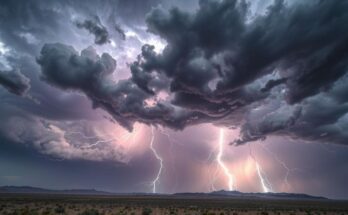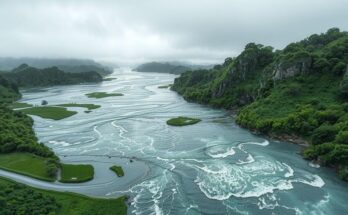Japan has partially lifted evacuation orders after rain curtailed a major wildfire in Iwate Prefecture, which had lasted over a week. The fire, the largest in over fifty years, resulted in one death and the evacuation of over 4,200 people. Rainfall aided firefighting efforts, and assessments of damage are ongoing.
On Friday, Japan announced the partial lifting of wildfire evacuation orders after rainfall assisted in halting the country’s most severe blaze in over fifty years. This wildfire, affecting the mountainous regions near Ofunato in Iwate Prefecture, had persisted for more than a week, resulting in one fatality and displacing over 4,200 residents. Wet weather, which began on Wednesday following an unprecedented dry spell, greatly aided firefighting efforts.
Toshifumi Onoda, a spokesman for the local fire department, stated, “Aerial reconnaissance this morning has not confirmed any spread of fire, fire reaching buildings or white smoke”. Firefighters planned to investigate the forests to ensure the fire was completely extinguished. Additionally, city official Shinichi Matsukawa indicated that the evacuation order for nearly 1,000 residents has been rescinded.
The wildfire devastated approximately 2,900 hectares, making it the largest in Japan in over fifty years, surpassing a 1975 fire in Hokkaido that burnt 2,700 hectares. Last year’s record-setting summer temperatures, exacerbated by climate change, contributed to this wildfire’s intensity. In February, Ofunato reported only 2.5 millimeters of rainfall, shattering the prior record low for that month.
At least 78 structures have sustained damage, with evaluations still underway by fire agencies. The frequency of wildfires in Japan has diminished since their peak in the 1970s. Typically occurring between February and May, Japan sees around 1,300 wildfires annually as dry conditions and winds contribute to their prevalence.
In summary, Japan’s recent experience with a devastating wildfire highlights the significant impact of climate conditions on fire behavior. The government has responded effectively with firefighting measures and the partial lifting of evacuation orders, providing relief to affected residents. The rapid changes in weather patterns emphasize the importance of ongoing attention to climate change and its implications for wildfire risks in Japan.
Original Source: www.japantimes.co.jp




